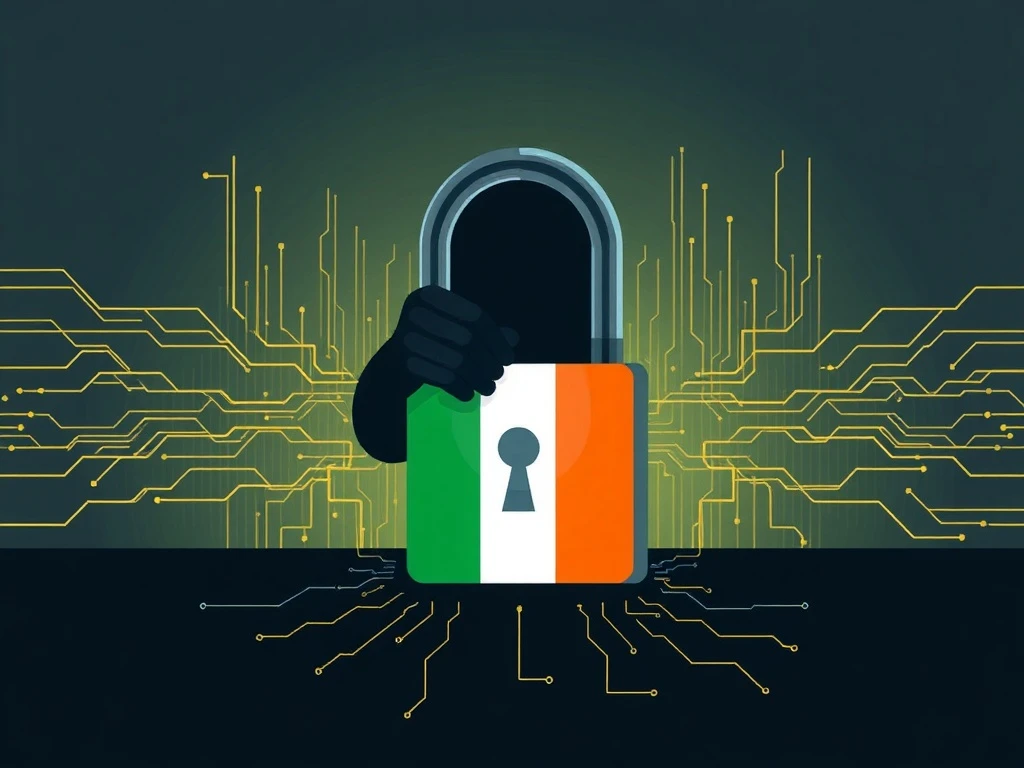Urgent Warning: Ireland’s Encryption Backdoor Law Threatens Digital Privacy

The digital realm thrives on trust and security, especially for those navigating the decentralized world of cryptocurrencies. However, proposed government actions can threaten this foundation. An encryption backdoor law in Ireland now faces fierce opposition. This raises significant concerns for digital privacy and online security across Europe.
Urgent Concerns Over Ireland’s Encryption Backdoor Proposal
Ireland’s government is currently developing the Communications Interception and Lawful Access Bill. This legislation aims to grant law enforcement access to encrypted messages. The bill remains in its pre-draft stage, with formal drafting expected in the coming months. However, the Global Encryption Coalition (GEC) has already issued an urgent call for its complete abandonment. Ryan Polk, an author for the GEC, penned an open letter highlighting the potential dangers. He argues that such a law could severely compromise security and deter international businesses. Ireland hosts the European headquarters for major tech companies like Apple and Meta. Consequently, its actions carry a disproportionate responsibility for global digital security standards.
Why an Encryption Backdoor Jeopardizes Digital Privacy
The core issue revolves around the integrity of encryption. Advocates for strong encryption contend that creating an encryption backdoor for law enforcement is fundamentally flawed. It operates on the misconception that such access can be limited solely to “good guys.” In reality, any deliberate weakening of encryption creates systemic vulnerabilities. Bad actors, including cybercriminals and hostile state actors, can exploit these same pathways. Polk explicitly states, “Encryption is a critical security feature; any deliberate weakening or circumvention of it creates systemic vulnerabilities that would endanger everyone and put Ireland’s national security at risk.” Therefore, weakening encryption directly jeopardizes digital privacy for individuals and businesses alike.
The Far-Reaching Impact of Ireland’s Encryption Law on Tech Giants
The proposed Ireland encryption law presents a difficult dilemma for tech companies. Platforms offering end-to-end encryption would face an impossible choice. They would either need to weaken their services’ security to comply with the law or consider exiting the Irish market entirely. Both outcomes would result in reduced privacy and weaker security for Irish citizens. Businesses and institutions, including government bodies, rely heavily on encryption to maintain trust in the digital world. Undermining this trust could have significant economic repercussions for Ireland. This situation underscores the critical need for robust digital safeguards.
Consequences of Weakening Encryption:
- Increased cybercrime, including fraud and identity theft.
- Heightened vulnerability to foreign cyberattacks.
- Compromised national security.
- Deterrence of tech businesses from Ireland.
- Reduced digital privacy for citizens and businesses.
Ireland’s Role in the Broader EU Chat Control Debate
The concerns surrounding Ireland’s domestic bill echo a broader European debate: the EU Chat Control proposal. This separate legislation seeks to mandate scanning messages *before* they are encrypted. Germany recently opposed this EU bill, dealing it a significant blow. The Global Encryption Coalition also urges Ireland to withdraw its support for the Chat Control proposal. They cite similar concerns regarding privacy and national security. Ireland will assume the EU Council’s presidency in July 2026. This position gives it a crucial role in shaping the future of the EU Chat Control law. The GEC emphasizes that the government must not “underestimate the grave consequences of weakening encryption.” Ultimately, the privacy and security of all European citizens depend on these decisions.
Protecting Digital Rights: The Global Encryption Coalition’s Stance
Weakening encryption would make individuals and businesses more susceptible to cybercrime. Fraud and identity theft could increase significantly. Moreover, sensitive data would become more vulnerable to foreign cyberattacks. This directly compromises national security. Ireland’s attractiveness as a tech hub, partly due to its location and corporate tax rates, could diminish. Tech giants depend on a secure digital environment. If the Ireland encryption law undermines this, it could lead to an exodus of companies or a decline in investment. Strong encryption, therefore, is not merely a privacy issue; it is a foundational element of economic stability and national defense in the digital age. The Global Encryption Coalition continues its advocacy for robust encryption standards. Their message is clear: an encryption backdoor creates more problems than it solves. Governments must prioritize the security and privacy of their citizens. Furthermore, they must foster an environment where technology can thrive without compromising fundamental digital freedoms. The decisions made regarding digital privacy and encryption today will shape the future of the internet for years to come.









